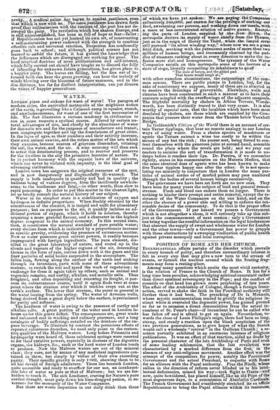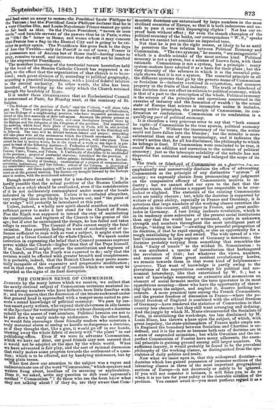POSITION OF ROME AND HER CHURCH. ECCLESIASTICAL affairs partake of
the disorder which prevails in every branch of polity, and therefore extraordinary interest is felt in every step that may give a new turn to the stream of . events, or furnish the nucleus around which the floating frag- ments may form a resting-place.
Among many questions which excite the most vivid curiosity, is the relation of France to the Church of Rome. • It has for a long time been peculiar, acknowledging spiritual stizerainte rather than direct spiritual sovereignty in.the Pope ; $nd the conflict of councils on that head has grown more perplexing of late years. The affair of the Archbishop of Cologne, though a foreign trans- action, served to shake the faith in the Pontifical authority still further than it had been. The preaching of De la Mennais, whose mystic sentimentalism tended to gratify the religious in- stinct while it. overruled the dogmatic power, has gained ground so far as to occasion a direct denunciation from the actual in- cumbent of St. Peter's chair—if incumbent he can be called who has fallen off and is afraid to get on amain. Nevertheletis, to- wards the close of Louis Philippe's reign, there had been so long, strong, and steady a reaction upon the blank scepticism of the two previous generations, as to give hopes of what the Scotch would call a wholesale "revival" in the Gallican Church;' a re- action partially exhibited in an enormous increase or religions publications. It was an effect of that reaction, aided no doubt by the personal character of the late Archbishop of Paris and even of some leading schismatics, that the 'last revolution was characterized by a marked difference from the first, in the absence of any anti-religious movement. Another effect was the attempt of the competitors for power, notably the Provisional Government and the actual President, to Coquette With Rome for an alliance with the Papal authority. Pius the Ninfb, whose sallies in the direction of reform never blinded us to ins intel- lectual deficiencies missed his way-,--took flight to Gaita—and 7
now, quite bewildered, has placed himself, like an Old e of the
most degenerate days, in a commission of AbsOlutist' airlines; The French Government had considerably stretched '' ex officio Republicanism to bring the Papal alliance within its resonrces; gsfistid.iiiifltsnarrnr to restorettfie PasittiflisaP Lbui Philippe ifs' the Vatican( but the ,pini Dolt ie 'Piht4ignist declare& that he is a very Charles. Dix; slid LøuIsNapoltlenio 'Pant tatinot: gis quite so far bank as Age. Sts tile; Prince PresitleirtrYsneeen de mon onelar? and hunible servant of the 'powers thatithli iii-PatisSwrites an "Obitlie Y. letter to Rome; and warns whofti it they concerti thatikande;has- a flag- in ;the, Exern al City and is gobs to:telri- solor.sisp011oyagens. - The-Pontificate has gone hack to the days of Leelthe Twelfth—only the ;Pontiff is. out of town; -France ii is possession not of Ancona but of Heine itself—having come to pray, remains, to scoff, and intimates that she will not be insulted by the Ungrateful Pontificates -
'fhisnanifest loosening of the territorial tenure heretofore held by the head of the ;Roman-Catholic Church has suggested a re- port, to the effect that tine -e tranization of that church is to here- .
vised; each great division of it according to political geography, acquiring a Practical' independence with a kind of federal relation to the' Central authority. In other words, the idea has been broached, of 'breaking 'up the unity which the Church retained through the heads-hip of llorne.
It is 'Under these circumstances that an Ecclesiastical Conneil. is summoned at Paris, for Monday next, at the seminary of St. Sulpice.
"The Bishops of the province Of Paris," says the Univers, "will alone lake part In it 'There will perhope. Matt' be present Cie Archbishop of Chalcedonia, and two.Bishops of a neighbounw province;r-who have requested permission to attend* tbisfirstassenably.of Mir colleagues. Amongst-the priests present at the Council will be some Grand Vicars, and some theologians brought there by- the Bishops and the delegates of the Chapters of ,thc,proyatee. The, supe.riors of the soiiitieff, Which'have their place of meeting in Paris, wPI be also invited. There will be-nocaternal ceremony' the rites marked out in the Pontifical:Will be followed. The time will be divided between labotir and prayer; everything will take place with all the seriousness which tite•Church commands.. No vain lissenssions, and particularly none connected with polities, will take place. Time cannot be lost in useless words, for in the space of a week or tee days it is pro- posed to treat of the following matters7-1. Profession of faith; Premeds] doun- eils; 'Dioceean Synods; Reports from Metropolitans and Suffragans; Bishops; Canoust_Cure3, Vicars, and Priests. 2. Uniforinity of dlecipline to be established in the province • project of provincial statutes; catechismi.fer the province: 3. Diocesan officialties; desservants; infirm priests; forbidden priests. 4: Ecclesi- astical studies; faculty of theology; essmination of a projeet of reorganization;
seminaries, institutions, and free schools; school of the Carmen, Onestio.atql
silaineeoimmuserroacwr. thTst; ma' —tiers .witrite esainined in privitte asiemtittess'agame
voted on it the general meeting. The degrees are brought forward by the Bishops alone in session, with the accustomed solemn' y
Enough matter and to spare for a ten-days discuision I Itis hardly possible that the actual position of the Roman Catholic Church as a rehole should be overlooked, even if the consideration of it be not deliberately Contemplated under some of the heads indieated in the programme. Unless it be eiteluded altogether, very startling ideas are likejy to be thrown outs-and " the point of
the wedge" will probably be introduced at this part. ;
Unless, indeed, a wholly new spirit should manifest itself with sufficient power to make a _last stand for the Church of Rome. Pius the Ninth was supposed to intend the'step of assimilating the constitution and regimen of the ChtirCh to the genius of -the age ;but if ever he entertained the design, he has failed and takes refuge in reaction. The Council Of Paris cannot supply the fatal omission. But possibly, feeling its want of authority and of in- fluence sufficient to cope with so vast a subject, it might start the project of a Great Council of the whole Church. We speak under correction in expressing the belief that a Council possesses supreme power within the ChurchLlhigher'than that of the Pope himself. If so, the Council might revise the constitution and regimen of the Church, as Pius the Ninth was expected to do ; only that the revision, would be effected with greater breadth and-completeness. It is probable', indeed, that the ROrnish Chinch May prove essen- tially incapable of this expansive and progressiire toodifieation ; and m that case, the conflicts of Councils which-we-note may be regarded as the signs of its final disruption. '



























 Previous page
Previous page